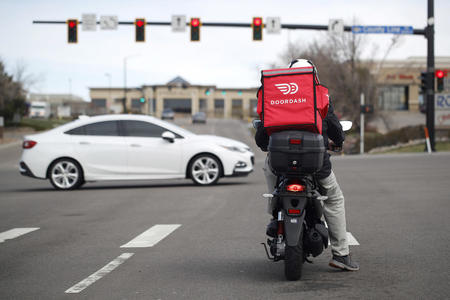App-based workers providing services full-time or part-time in Seattle will be eligible for paid leave for doctor’s appointments, recovery from an illness or injury, preventative care, care of a family member or for safety reasons related to domestic violence, sexual assault or stalking.
“We all need to be able to take a day off when we feel sick or when our kiddos or family members feel sick,” said Councilmember Teresa Mosqueda, the legislation’s sponsor, during Tuesday’s council meeting. “It’s good for the health of our workers. It’s also good for the health of our local economy, as it is for the health of our general population.”
The new law makes permanent a pandemic-era benefit for food delivery workers on platforms such as Instacart, DoorDash and Uber Eats that was set to expire at the end of April. It also expands the scope of who is entitled to paid sick time to include any app-based worker providing on-demand services, such as car washes and laundry, for a company with 250 or more workers on its platform worldwide.
Gig workers will accrue one day of paid sick leave for every 30 days of work they do on the app that include work-related stops in Seattle, such as picking up or delivering an order.
Tuesday’s city council meeting was mostly a victory lap for supporters of paid sick and safe leave, with no final debate among councilmembers. Councilmembers Alex Pedersen and Sara Nelson, who abstained from passing the ordinance out of committee last week over concerns about its potential impact on local companies, voted yes on the final legislation.
A half-dozen gig workers and labor representatives testified in favor of the law during public comment before the council passed it. Joel Shapiro, co-founder of grocery delivery company Dumpling, and Michael Wolf, executive director of Drive Forward, a ride-hailing industry trade group, both testified in support as well. No one spoke out against the law during public comment.
“I do not survive paycheck to paycheck; I survive order by order,” said Carmen Figueroa, a Seattle gig worker who said her disability keeps her from working a traditional job. “Without [paid sick and safe time], I am forced to work in inclement weather, hazardous road conditions, or while sick or in pain. Paid safe and sick time provides disabled gig workers peace of mind knowing they do not have to push themselves past their physical limits or jeopardize their cars to earn an income to live and stay alive.”
The new law does not cover workers on so-called marketplace network companies such as Rover and TaskRabbit – companies that don’t monitor worker time and mileage and where workers can set their own rates and interface with prospective customers before accepting jobs.
Ride-hailing drivers are not covered by Seattle’s new law because they are already covered by a 2022 state law that sets base pay standards and provides sick leave for transportation network company workers and preempts cities from passing their own workplace standards for the companies.
Traditional employees have been covered by Seattle’s mandatory paid sick and safe time law since 2012. But gig workers are classified as independent contractors and are not covered by the same workplace standards. Last year the city council passed an ordinance setting a minimum wage and other workplace protections for gig workers.
For food delivery drivers previously covered by the temporary pandemic sick leave measure, the new law takes effect on May 1. For all other gig workers, the law takes effect on Jan. 14, 2024.
Get daily news in your inbox
This newsletter curates some of the most important headlines of the day from Crosscut and other news outlets.





